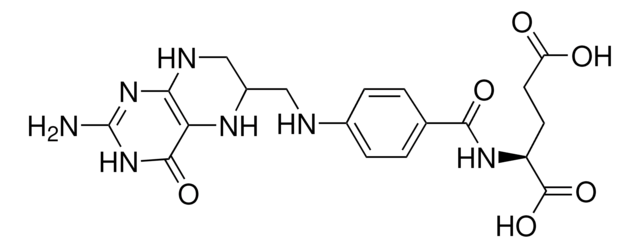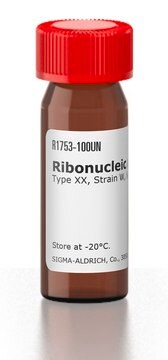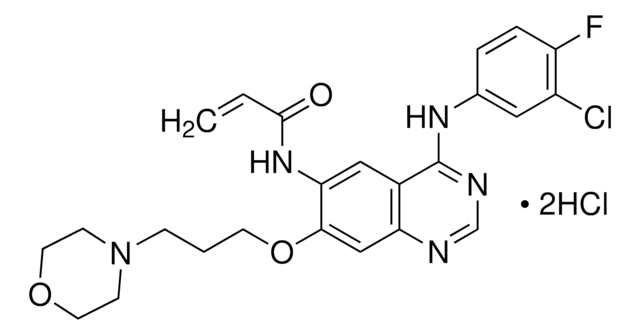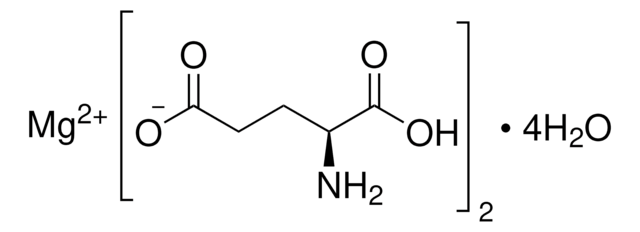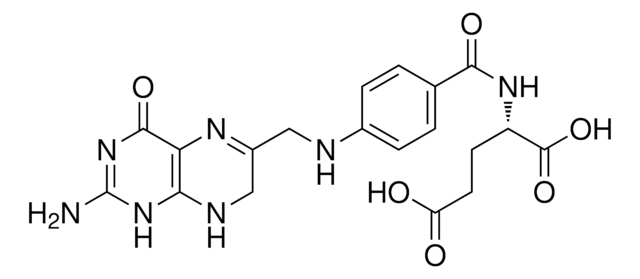47612
Folinic acid calcium salt hydrate
BioXtra, ≥99.0% (HPLC)
Synonym(s):
5-Formyl-5,6,7,8-tetrahydrofolic acid calcium salt, 5-Formyl-5,6,7,8-tetrahydropteroyl-L-glutamic acid calcium salt, 5-HCO-H4PteGlu, Calcium folinate, Citrovorum factor calcium salt, Leucovorin calcium salt
About This Item
Recommended Products
biological source
synthetic
Quality Level
product line
BioXtra
Assay
≥99.0% (HPLC)
form
powder or crystals
technique(s)
cell culture | mammalian: suitable
color
white to faint yellow
mp
240-250 °C
application(s)
cell analysis
SMILES string
[Ca++].[H]O[H].[H]C(=O)N1C(CNc2ccc(cc2)C(=O)N[C@@H](CCC([O-])=O)C([O-])=O)CNc3nc(N)nc(O)c13
InChI
1S/C20H23N7O7.Ca/c21-20-25-16-15(18(32)26-20)27(9-28)12(8-23-16)7-22-11-3-1-10(2-4-11)17(31)24-13(19(33)34)5-6-14(29)30;/h1-4,9,12-13,22H,5-8H2,(H,24,31)(H,29,30)(H,33,34)(H4,21,23,25,26,32);/q;+2/p-2/t12?,13-;/m0./s1
InChI key
KVUAALJSMIVURS-ZEDZUCNESA-L
Looking for similar products? Visit Product Comparison Guide
General description
Application
Biochem/physiol Actions
Other Notes
Signal Word
Danger
Hazard Statements
Precautionary Statements
Hazard Classifications
Eye Irrit. 2 - Resp. Sens. 1 - Skin Irrit. 2 - Skin Sens. 1 - STOT SE 3
Target Organs
Respiratory system
Storage Class Code
11 - Combustible Solids
WGK
WGK 3
Flash Point(F)
Not applicable
Flash Point(C)
Not applicable
Personal Protective Equipment
Certificates of Analysis (COA)
Search for Certificates of Analysis (COA) by entering the products Lot/Batch Number. Lot and Batch Numbers can be found on a product’s label following the words ‘Lot’ or ‘Batch’.
Already Own This Product?
Find documentation for the products that you have recently purchased in the Document Library.
Customers Also Viewed
Articles
This article reviews some of our newest and most innovative technologies and their specific applications toward cancer research. It describes how complex the disease of cancer is, and how difficult it is to identify one topic that is completely unrelated to any other.
This issue of Biofiles reviews some of our newest and most innovative technologies and their specific applications toward cancer research. In preparing this issue of Biofiles, one is reminded how complex the disease of cancer is, and how difficult it is to identify one topic that is completely unrelated to any other.
Our team of scientists has experience in all areas of research including Life Science, Material Science, Chemical Synthesis, Chromatography, Analytical and many others.
Contact Technical Service



